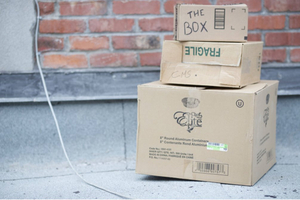Review: THE BOX at Studio Hydro-Quebec Monument-National
A remarkably tender study in masculine vulnerability at the Montreal Fringe festival.

The Box, by Playwright Nils Svensson Carell is a warm, tightly-acted character study about men and masculinity. It's a very tender examination of the subject-not explicitly feminist, but touched by feminism. It depicts its men as well-meaning, foolish, and hubristic as they entangle themselves in the small human harms we all commit out of genuine vulnerability.
Finn has lost Sarah. He doesn't know how. He thought things were fine, and then she left him-now his friend has arrived to help him pack up the apartment he can no longer afford alone. Packing, they both find Finn's anger box-a coping strategy for his temper and tendency to ruminate, where he "puts" interpersonal disputes once he's ready to move on. He does this, he says, instead of acting out in anger.
Baffled, his friend points out that Finn's pattern in anger-to lash out, withdraw for great lengths of time to stew and punish with silence, and then suddenly return with no acknowledgement of the conflict-is also acting out in anger, and something that makes relationship with him difficult, and that while the box may have started as a coping strategy it has become a lockbox for resentments Finn refuses to let go, and a reason not to communicate with the people in his life.
Finn starts to question his time with Sarah, their breakup, his life, and his future, in the wake of this revelation. What kind of world has he been building, holding on to old hurts, and making no room for hope?
I really like this little play. I can see it doing very well in high schools and cegeps, or in the context of drama therapy, undoing the ongoing damage of millennia of toxic patriarchy and the sad trick it played on men and boys-training them to believe they were only permitted two emotional states, fear or anger (which is also fear). The Box grapples with big human problems-like what do we do to step in between ourselves and the addctive cycle of rumination, or how do I actually and effectively let go of the resentments I'm hoarding like a thousand shiny little stones? The chemistry between the two main actors (Nils Svensson Carell and Lucas Di Tecco) is organic and exciting-well-suited for a small theatre, nudging closer to film than stage in its subtlety and dynamics. Di Tecco shines as a man who is both a fool and a sage-someone whose buffoonish charm is precisely what allows him to disarm you enough to change your life.
The main flaw that I noticed was that I felt the physical presence of Sarah (played competently, though she didn't have much to do, by Skylar Clark) to be unnecessary, and I want to see how the play flows without her on stage. I know that there are implications, in theatre, to depicting a woman we never see. I think this work is wholesome enough that it wouldn't fall into a trap of dehumanization. I think of Tomson Highway's Dry Lips Oughta Move To Kapuskasing as an example of a play about men and masculinity in which the female characters are both human and an idea, or a monolith (this is communicated by all of them being played by the same actor, who also plays the shape-shifting trickster Nanabush.) To show the hands of my politics: I think gender is ultimately an arbitrary social role-a construct, which was thought of rigidly as a biological given for most of human history, but which has somewhat recently revealed itself to be a thin piece of biology toast with a lot of political and historical peanut butter and jam spread on top. This social role is one that people either fill or do not, and their filling it has material implications in their life and in society.
It makes perfect sense, then, that Sarah the person is in Finn's life as both a person and a kind of ambassador for the monolith of femininity (this is always part of what happens in relationships between people in a gendered society). This is what causes an internal crisis which is as much about Finn as it is about the monolith of masculinity. Grappling with identity like that means grappling with some of the primary questions of being alive-something for which we ultimately need hope, and a place to put it.
Find out more about the St Ambroise Montreal Fringe Festival and their 30th anniversary hybrid festival here.
Buy tickets for The Box and other performances here.
Follow and support Tara's substack for ekphrasis, creative non-fiction, and additional coverage of arts and letters in Montreal here.
Reader Reviews

Videos
